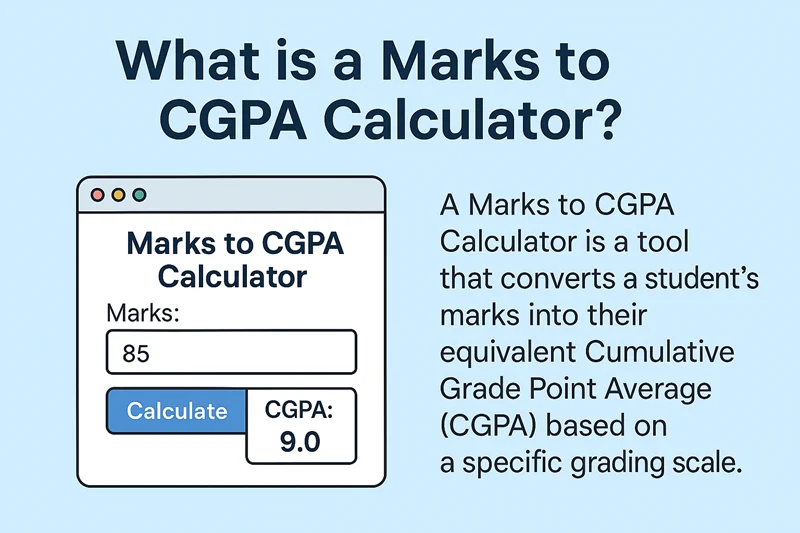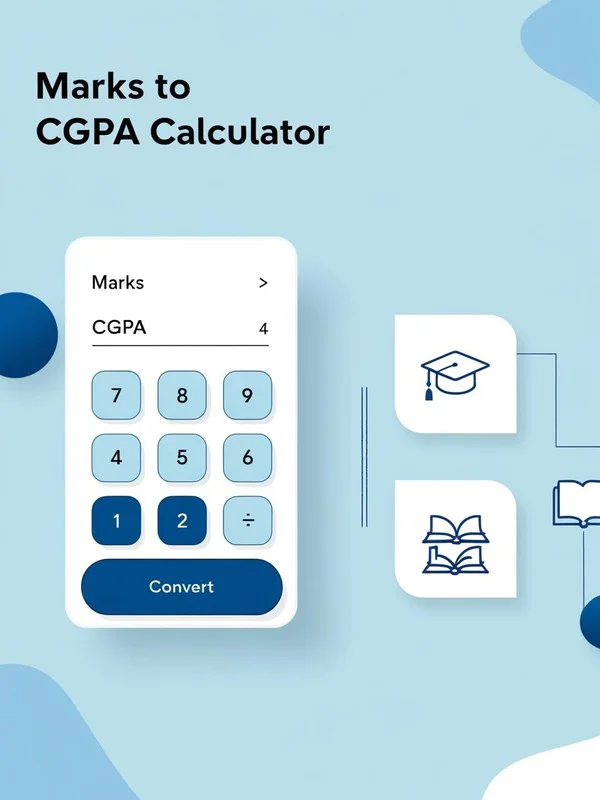CGPA, or Cumulative Grade Point Average, is a standardized way to measure your academic performance across subjects. Instead of looking at raw marks, CGPA gives you a clear idea of how well you’re doing overall. In many cases, students first calculate their percentage using a Marks Percentage Calculator and then convert those results into CGPA for academic records.
For students, converting marks to CGPA manually can be confusing and time-consuming. That’s where a Marks to CGPA Calculator comes in. This tool provides instant, accurate results, saving you time and reducing errors.
With this calculator, you can quickly find your CGPA for a single semester or cumulatively for multiple semesters, making it perfect for applications, transcripts, and resumes.
Using the calculator is simple. Just follow these steps:
Tips:
Use the calculator for all your semesters to get an accurate cumulative CGPA.

The standard formula for converting marks to CGPA is:
CGPA=Marks ObtainedMaximum Marks×Grade Point Scale\text{CGPA} = \frac{\text{Marks Obtained}}{\text{Maximum Marks}} \times \text{Grade Point Scale}CGPA=Maximum MarksMarks Obtained×Grade Point Scale
Worked Example:
CGPA=450500×10=9\text{CGPA} = \frac{450}{500} \times 10 = 9CGPA=500450×10=9
Many universities have their own CGPA formula. Our calculator supports university-specific variations to give accurate results.
Here’s a quick marks to grade point and CGPA table for reference:
Marks (%) | Grade | Grade Point | CGPA |
|---|---|---|---|
90–100 | A+ | 10 | 10 |
80–89 | A | 9 | 9 |
70–79 | B+ | 8 | 8 |
60–69 | B | 7 | 7 |
50–59 | C+ | 6 | 6 |
40–49 | C | 5 | 5 |
<40 | F | 0 | 0 |
Semester Example:
CGPA = (9×3 + 8×4 + 10×3) ÷ (3+4+3) = 8.7

CGPA is the average of grade points earned across subjects, representing overall academic performance.
Divide marks obtained by maximum marks and multiply by the grade point scale.
Yes, some universities provide formulas for CGPA to percentage conversion.
Most calculators support multiple subjects and semesters.
No, grading systems vary significantly across countries and even between institutions within the same country. This is why it's important to understand your specific institution's grading policy and use calculators designed for that system.
A Marks to CGPA Calculator is a must-have tool for students looking to save time, avoid errors, and get accurate academic results. Whether it’s semester CGPA or cumulative CGPA, using this calculator makes your life easier.
Try the CGPA Calculator now and get your CGPA instantly!